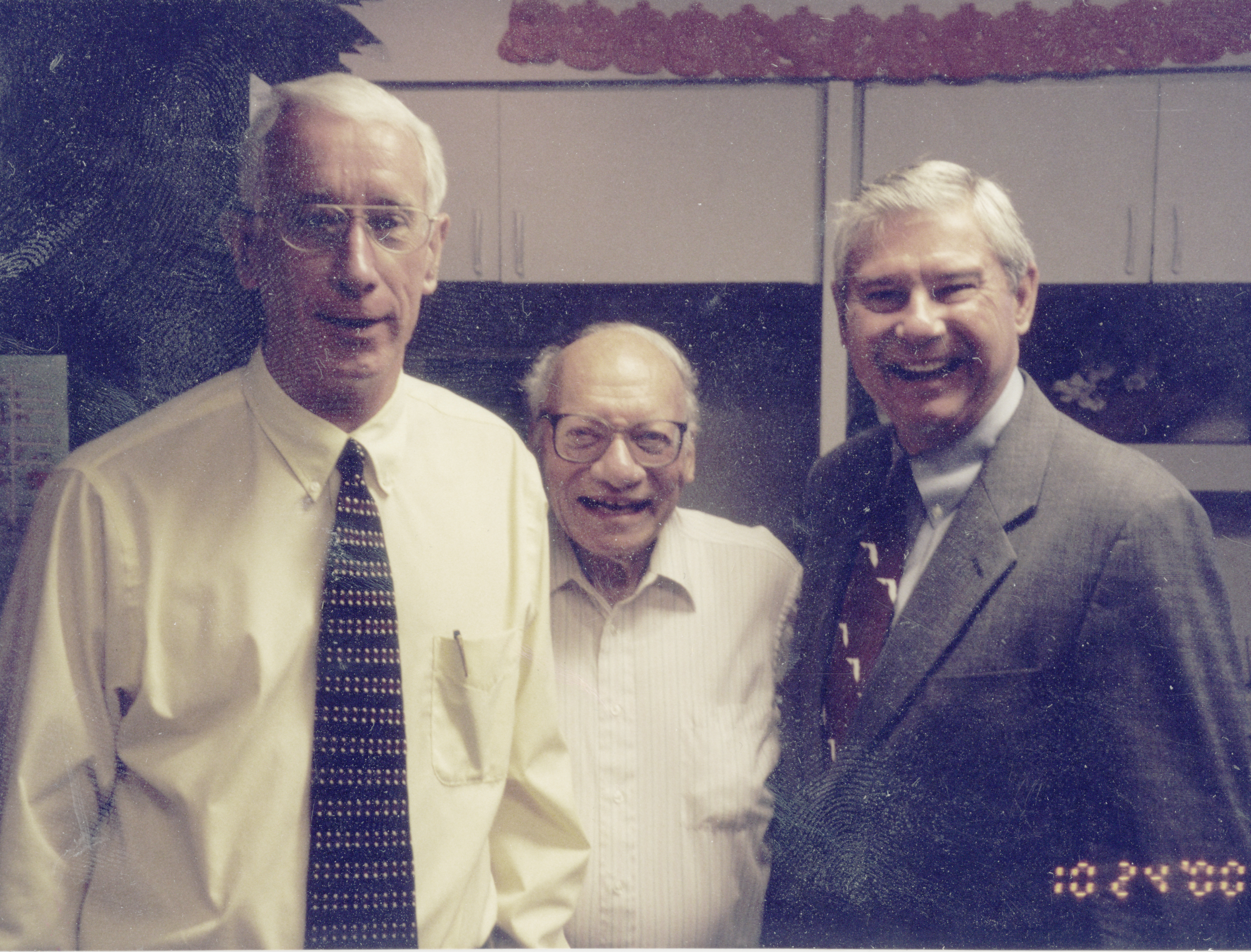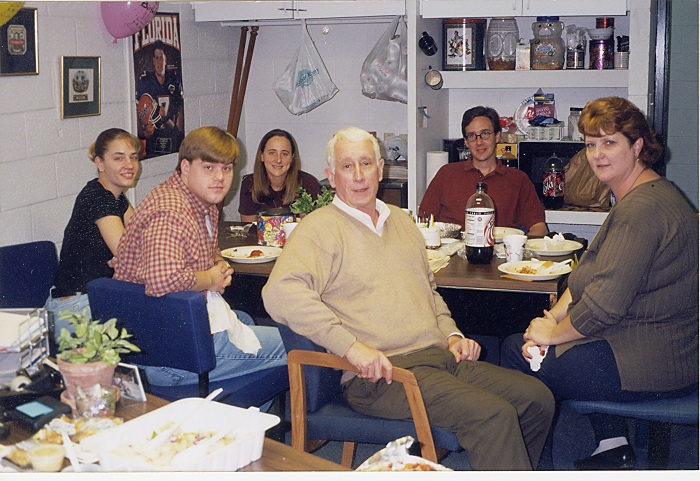I think it is part of the mass humanity and that’s why oral history is fascinating, to interview all these people at different levels, with different positions, different experiences, and you get them all together and it does give you this broad, cross section of humanity, it really does.
-Dr. Julian Pleasants, UF-322
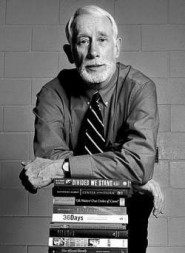
Oral History with Dr. Pleasants
- Dr. Paul Ortiz’s oral history interview, conducted with Dr. Julian Pleasants, is available online through the Samuel Proctor Oral History Program archives in the University of Florida collection.
- Watch UF-322, now available on YouTube!
Dr. Julian Pleasants, director of the Samuel Proctor Oral History Program from 1996-2007, worked for the University of Florida for thirty-seven years in a celebrated teaching and research career.
Dr. Pleasants received his A.B. from Davidson College in North Carolina in 1960, and earned his M.A. and Ph.D. from the University of North Carolina, Chapel Hill, in 1962 and 1971, respectively, where he studied American History. Before arriving at the University of Florida, he was an instructor at Converse College in Spartanburg, South Carolina and worked as an assistant professor at Western Carolina University in Cullowhee, North Carolina.
In 1969, Dr. Pleasants was hired as a professor at the University of Florida. At UF, he specialized in twentieth century U.S. History and Southern History, the New Deal period, history of the Trans-Mississippi West, Southern and Florida politics, Seminole Indians, and Florida newspapers. As SPOHP director, Dr. Pleasants published several books on oral history collections, including “”And My Values Are Still There: Seminole Reflections on Their Changing Society, 1970-2000,” “Gator Tales,” and “Hanging Chads” (see listing below).
Dr. Pleasants won a total of twelve teaching awards during his tenure at the University of Florida, as one of eight Outstanding Professors in 1972, one of ten Outstanding Professors in 1974, Teacher of the Year for the College of Liberal Arts and Sciences in 1989 (chosen by students), Faculty Award for Excellence in Instruction for the College of Liberal Arts and Sciences in 1989, Most Inspiring Professor from the Panhellenic Council in 1989, and State of Florida Teaching Improvement Award in 1995.
Dr. Pleasants retired from the University of Florida in 2007, and lives in North Carolina.
Books
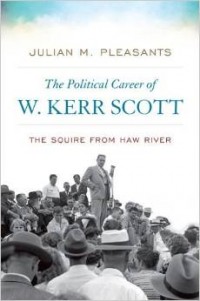 “The Political Career of W. Kerr Scott: The Squire from Haw River”
“The Political Career of W. Kerr Scott: The Squire from Haw River”
by Dr. Julian M. Pleasants
University Press of Kentucky (2014)
Book available through Amazon
When W. Kerr Scott (1896–1958) began his campaign for the North Carolina gubernatorial seat in 1948, his opponents derided his candidacy as a farce. However, the plainspoken dairy farmer quickly gathered loyal supporters and mobilized a grassroots attack on the entrenched interests that had long controlled the state government, winning the race in a historic upset.
In this meticulously researched book, Julian M. Pleasants traces Scott’s productive and controversial political career, from his years as North Carolina commissioner of agriculture, through his governorship (1949–1953), to his brief tenure as a U.S. senator (1954–1958). Scott was elected at a time when southern liberals were on the rise in post–World War II America. McCarthyism and civil rights agitation soon overwhelmed progressivism, but the trend lasted long enough for the straight-talking “Squire from Haw River” to enact major reforms and establish a reputation as one of the more interesting and influential southern politicians of the twentieth century.
Scott introduced groundbreaking legislation that placed the Tar Heel State at the forefront of the southern economy, improving roads, schools, and medical facilities while widening access to electric and phone service. Scott was also relatively socially progressive and made significant appointments of women, African Americans, and liberals to positions of influence and power. This long-overdue look at his political career illuminates the spirit that transformed an introspective, segregated society dependent on tobacco and textiles into a vibrant, diversified economy at the center of the industrial, banking, and information revolution in the South.
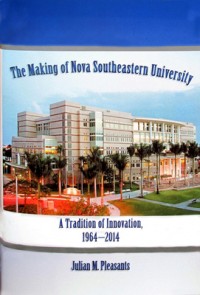
“The Making of Nova Southeastern University: A Tradition of Innovation, 1964-2014”
by Dr. Julian M. Pleasants
Nova Southeastern University (2013)
Book available through Amazon
Nova Southeastern University is a flourishing university with a fascinating past. Arising from the shared dream of local community businessmen in Broward County, Florida, the university was chartered in 1964. At the time, it had no buildings to its name—just an empty plot of land and a dedicated group of visionary advocates.
On the fiftieth anniversary of NSU’s founding, this book tells the amazing story of what is now one of the largest not-for-profit universities in the United States. Today, Nova Southeastern University serves more than 27,000 students and has produced more than 150,000 alumni. Its main campus in Fort Lauderdale is beautifully landscaped, with modern classroom buildings, an array of student housing options, state-of-the-art athletic facilities, and a unique joint-use library, the largest library building in the state of Florida. Through distance-learning and travel study programs, NSU’s presence extends throughout the United States and around the world.
Using interviews with present and past NSU presidents, faculty, administrators, staff, students, and even NSU’s original founders, award-winning historian Dr. Julian Pleasants provides an insider’s view of the story behind the school. He re-creates the scene of a meeting one night in the 1960s when local businessman Jack Hines pounded on a dining room table and said, “We’ve just got to have a university.” Against all odds, they succeeded. Dr. Pleasants describes the arrival of NSU’s very first graduate students, reveals the internal conflicts that challenged the school’s program development, and related the frightening brush with bankruptcy that threatened to close the doors of the young university forever.
The personal testimonies are backed by a wealth of primary sources, including board of trustees minutes, unpublished manuscripts, administrative documents, and presidential papers from the NSU archives. Rare photographs offer a glimpse into the early history, culture, and architecture of the university. The Making of Nova Southeastern University shows how this unique school overcame tremendous odds in just five decades to become an innovative leader in higher education and ushers in NSU’s next fifty years of growth and creativity.
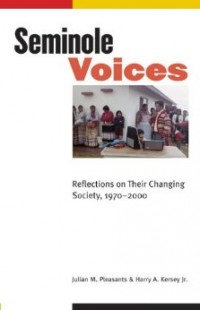 “Seminole Voices: Seminole Reflections on Their Changing Society, 1970-2000”
“Seminole Voices: Seminole Reflections on Their Changing Society, 1970-2000”
by Dr. Julian M. Pleasants and Harry A. Kersey, Jr.
University of Nebraska Press (2010)
Book available through Amazon
In a series of interviews conducted from 1969 to 1971 and again from 1998 to 1999, more than two hundred members of the Florida Seminole community described their lives for the Samuel Proctor Oral History Program at the University of Florida. Some of those interviews, now showcased in this volume, shed light on how the Seminoles’ society, culture, religion, government, health care, and economy had changed during a tumultuous period in Florida’s history.
In 1970 the Seminoles lived in relative poverty, dependent on the Bureau of Indian Affairs, tourist trade, cattle breeding, handicrafts, and truck farming. By 2006 they were operating six casinos, and in 2007 they purchased Hard Rock International for $965 million. Within one generation, the tribe moved from poverty and relative obscurity to entrepreneurial success and wealth.
Seminole Voices relates how economic changes have affected everyday life and values. The Seminoles’ frank opinions and fascinating stories offer a window into the world of a modern Native community as well as a useful barometer of changes affecting its members at the beginning of the twenty-first century.
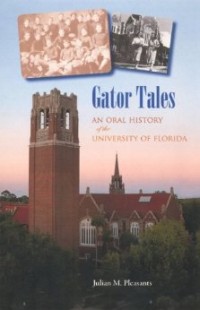 “Gator Tales: An Oral History of the University of Florida”
“Gator Tales: An Oral History of the University of Florida”
by Dr. Julian Pleasants, former director of the Sam Proctor Oral History Program
(University Press of Florida, 2006)
Book available through Amazon
This lively, anecdotal history provides an intimate look at the University of Florida’s past 100 years – from the earliest days in Gainesville to milestones in campus expansion and institutional growth, including the infamous Johns Committee, Civil Rights protests and Gator athletics.
UF’s thirteen presidents provide a colorful introduction to a remarkable century’s progress. As early as 1909, Albert A. Murphree recognized the university’s growing pains and embarked on a drive to expand significantly on the campus’s two buildings. During his tenure, UF experienced the influenza pandemic and greeted the inaugural issue of the Florida Alligator. Subsequent administrations augmented the university’s strengths in new ways. John J. Tigert gave UF its first constitution. While presiding over the introduction of women into university life, J. Hillis Miller initiated the most energetic building expansion in the university’s history, while securing the addition of medical and nursing schools at UF. The building frenzy continued apace under J. Wayne Reitz, who also invested considerable effort in improving the life of the campus, adding housing for married students and co ed dorms. Reitz also maintained an active involvement in the athletic program, even venturing a stormy half time visit to an FSU locker room where he berated the coach for using stalling tactics. He demanded FSU either “go out there and play ball” or “go home right now.”
Beyond the administrative history of the first 100 years, Gator Tales features interviews with nine notable individuals whose influences have extended from within UF to the broader worlds of business, law, and sports: Ray Graves, Otis Boggs, Tracey Caulkins, Steve O’ Connell, John Lombardi, Marna Brady, John Dasburg, Manny Fernandez, and Stephan Mickle. Each interview provides a window into a particular time and set of challenges in the history of UF, while reflecting the personal qualities that enabled each individual to have a substantial impact on both colleagues and the institution itself.
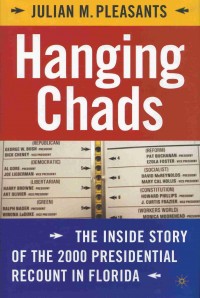 “Hanging Chads: The Inside Story of the 2000 Presidential Recount in Florida”
“Hanging Chads: The Inside Story of the 2000 Presidential Recount in Florida”
by Dr. Julian Pleasants, former director of the Sam Proctor Oral History Program
(Palgrave Macmillan, 2004)
Book available through Amazon
Dr. Julian Pleasants writes about the 2000 Presidential Recount in Florida.
Reviews
“Julian Pleasants has given us the definitive book on the disputed presidential election of 2000. Hanging Chads reveals how a badly flawed Florida ballot and the denial of a recount awarded the presidency to a candidate who lost by half a million votes in the popular count.”
-Former U.S. Senator George McGovern
“Pleasants…offers a new take on the infamous presidential election of 2000. The majority of chapters consist of question-and-answer interviews–all but one conducted by the author–with key figures in the Sunshine State’s election debacle…In addition to these Q & As, there’s a concise introduction chronicling the events that ended with the federal Supreme Court’s landmark decision, a helpful ‘cast of characters’ section and a compendium of court cases and legal terms that comes in handy when navigating the judicial jungle surrounding the election.”
-Publishers Weekly review
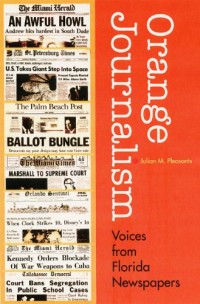 “Orange Journalism: Voices from Florida Newspapers”
“Orange Journalism: Voices from Florida Newspapers”
by Dr. Julian Pleasants
(University Press of Florida, 2004)
Book available through Amazon
Newspapers in Florida are generally regarded as among the best in the country. Despite its image as a modern sun-and-fun frontier state filled with eccentrics, corrupt politicians, and feuding immigrant communities, Florida has become an economic, political, and social juggernaut that continues to have a significant impact on America. Orange Journalism presents 18 writers, editors, and publishers who have nurtured and influenced the high quality of print journalism in Florida during the last half-century.
Focusing on both the daily and the weekly press, this oral history includes candid interviews with visionaries like Al Neuharth, who founded USA Today, and prominent writers such as Carl Hiaasen and Rick Bragg. The book features conversations with sportswriters, investigative journalists, editorial cartoonists, Pulitzer prize-winning writers, and the publishers of an African American and a Spanish-language paper. It also includes interviews with publishers of large state newspapers (David Lawrence of the Miami Herald); medium-sized papers (Diane McFarlin of the Sarasota Herald Tribune); and smaller weeklies (the colorful Tommy Green of the Madison Country Carrier). It covers the state with journalists from all major newspaper chains in Florida, as well as a rapidly dwindling group of independent newspapers, primarily the St. Petersburg Times.
For students of the Fourth Estate, these lively interviews offer insights about the status of women in a traditionally male profession, the impact of new technology on newspapers, and management differences between large national conglomerates and state newspapers. The book also explores ownership issues between corporate conglomerates and family-owned and independent papers. For general readers, comments on topics like race, class, drugs, and tourism, with observations on specific issues such as civil rights in Miami and the growth of the space industry and Disney World, illuminate the important role that Florida newspapers play in politics, economics, and the environment. Personal and relevant, Orange Journalism delivers the inside scoop on a profession that serves as the eyes and ears of the public.
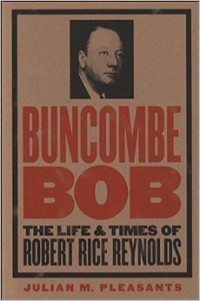 “Buncombe Bob: The Life & Times of Robert Rice Reynolds”
“Buncombe Bob: The Life & Times of Robert Rice Reynolds”
by Dr. Julian Pleasants
(University Press of Florida, 2000)
Book available through Amazon
Robert Rice Reynolds (1884-1963), U.S. senator from North Carolina from 1933 to 1945, was one of the most eccentric politicians in American history. His travels, his five marriages, his public faux pas, and his flamboyant campaigns provided years of amusement for his constituents. This political biography rescues Reynolds from his cartoon-character reputation, however, by explaining his political appeal and highlighting his genuine contributions without overlooking his flaws.
Julian Pleasants argues that Reynolds must be understood in the context of Depression-era North Carolina. He capitalized on the discontent of the poverty-stricken lower class by campaigning in tattered clothes while driving a ramshackle Model T–a sharp contrast to his wealthy, chauffeur-driven opponent, incumbent senator Cam Morrison. In office, Reynolds supported Roosevelt’s New Deal. Although he was not pro-Nazi, his isolationist stance and his association with virulent right-wingers enraged his constituents and ultimately led to his withdrawal from politics.
Pleasants reveals Reynolds to be a showman of the first order, a skilled practitioner of class politics, and a unique southern politician–the only one who favored the New Deal while advocating isolationist views.
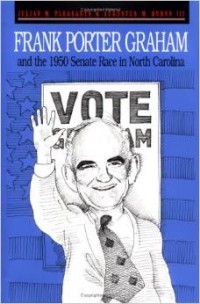
“Frank Porter Graham and the 1950 Senate Race in North Carolina”
by Dr. Julian Plesants
(University of North Carolina Press, 1990)
Book available through Amazon
The tumultuous North Carolina Senate primaries of 1950 are still viewed as the most bitter chapter in the state’s modern political history. The central figure in that frenzied race was the appointed incumbent, Frank Porter Graham, former president of the University of North Carolina (1931-49) and liberal activist of national stature.
As a Senate candidate, Graham was unrelentingly attacked for both his social activism and his racial views, and the vicious tactics used against him shocked his supporters and alarmed national observers. Peeling away the myths that have accumulated over the years, the authors present the first thoroughly researched account of Graham’s eventual defeat by Raleigh attorney Willis Smith. The result, a balanced study of North Carolina politics at mid-century, is a convincing explanation of the 1950 election.
Using the campaign as a prism, the authors assess the factional struggles within the state, showing that Graham was defeated by a massive loss of support among white voters in eastern North Carolina. The principal force behind this switch was the fear promulgated by the Smith campaign that a vote for Graham was a vote to end statutory segregation in North Carolina. The authors also offer the fullest portrait to date of Frank Porter Graham as political candidate and social reformer. They examine his career as an educator and public activist, the steps that led to his unorthodox appointment, and his strengths and weaknesses as a political candidate.
Frank Porter Graham and the 1950 Senate Race in North Carolina is based on manuscript materials never before examined, on interviews with more than 50 campaign participants and associates of both Graham and Smith, and on a thorough analysis of newspaper coverage and campaign literature.
The issues that are relevant for me are these more human issues and emotions and commitment to country or job or family or whatever it might be. That’s what makes it comes alive. That’s where the drama is.
-Dr. Julian Pleasants, UF-322
For additional information, contact SPOHP, call the offices at (352) 392-7168, and connect with us online today.
